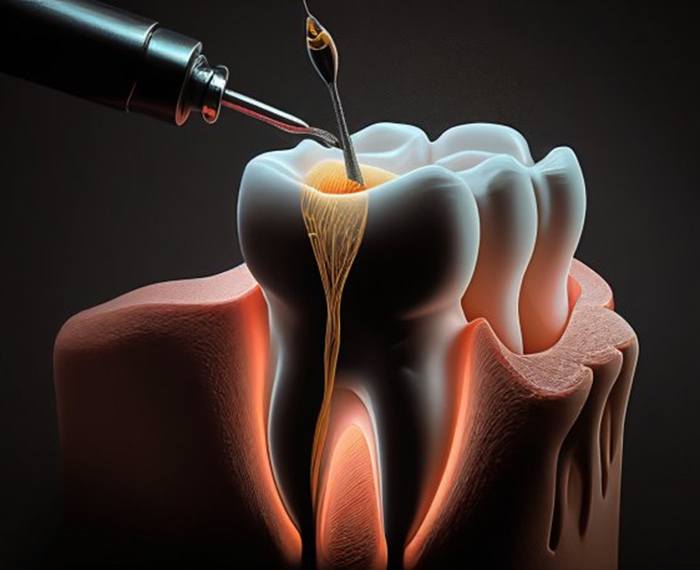Root Canal Treatment – Gilbert, AZ
A Direct Approach to Relieving Pain & Saving Your Tooth
Most people assume root canal treatment involves a process that is both painful and frightening. However, this couldn’t be further from the truth. The procedure itself is practically pain-free and is performed to repair damaged or decayed teeth, effectively helping you avoid further discomfort in the long run. Read on to learn more about root canal treatment or feel free to give us a call today to schedule an appointment.
Why Choose Desert Springs Dental for Root Canal Treatment?
- Highly Experienced & Professional Dental Team
- Sedation Dentistry Available for Maximum Comfort
- Uses State-of-the-Art Dental Technology & Techniques
Do I Need Root Canal Treatment?

Although a toothache doesn’t automatically mean you’ll need a root canal, it’s considered one of the most common indications for needing one. In general, this procedure is reserved for people who are struggling with decayed, damaged, or infected teeth that can no longer be repaired with dental crowns or fillings. Some typical signs that you may need root canal treatment include:
- Serous tooth pain that persists past 24 hours
- Discomfort in one or several teeth when biting down
- Worsening tooth sensitivity to hot/cold temperatures
- Small bumps on the gums near the painful tooth
- Red, inflamed, tender, or sore gums
The Root Canal Process

The root canal process is designed to alleviate pain and repair teeth that are damaged or decayed. To do so, we’ll first administer a local anesthetic to help completely numb your mouth, that way you can remain pain-free throughout your visit. We can even provide you with sedation dentistry so that you can be as relaxed and comfortable as possible while getting dental work done.
Once the area has been numbed, Dr. Condie will create a tiny hole in your enamel so that she can extract the decayed and infected tissues from within the tooth. Afterward, she’ll clean and disinfect your tooth so that there won’t be any bacteria left once she seals up the space with biocompatible filling material. Finally, she’ll likely place a dental crown atop the tooth to protect and preserve it for many years to come.
The Benefits of Getting a Root Canal

Not only is root canal treatment safe and reliable, but it also offers a variety of other benefits, including:
- Pain-Free Procedure: You shouldn’t expect any discomfort while undergoing the procedure. Most patients claim it feels like getting a regular tooth filling, and it requires less time for recovery compared to a tooth extraction.
- Eliminate Harmful Bacteria: Our team will remove all harmful particles from the inner layers of your tooth, preventing pain in the long term.
- Preserve Damaged Teeth: Keeping your natural tooth from needing to be extracted can also save you time, money, and further complications that come with tooth loss.
Understanding the Cost of Root Canals

While a root canal may be the best way to address advanced tooth decay or a severe dental injury, it’s understandable that you would be interested in how much you can expect to pay before receiving the treatment. A range of factors contribute to the overall cost of a root canal, and we’ll be sure to provide you with a proper cost estimate during your consultation. Here’s a brief guide to how root canal treatments are priced at Desert Springs Dental, but please contact our staff if you’d like more information.
Factors That Can Affect Root Canal Cost

While it’s exceedingly difficult to determine the exact cost of root canal treatment before the troubled tooth or teeth have been evaluated at our Gilbert office, there are a few factors that largely determine the final price tag. These include:
- The type of tooth and where it is located in the mouth: Molars located in the back of the mouth are larger and harder to reach, so treating them is generally more costly than treating the front teeth.
- The complexity of the root canal procedure: We perform root canal treatments in-house so you won’t have to worry about seeing an outside specialist who uses a different pricing structure.
- The cost of any additional services: In many cases, it is necessary to place a dental crown on a tooth that has received a root canal to protect and rebuild it, and the cost of any additional treatments will be noted on your final bill.
Is it Cheaper to Pull My Tooth?

While a patient may think that they’d rather skip their root canal and have their tooth pulled instead, this can create more problems than it solves. While tooth extraction may seem less expensive than a root canal at first, the loss of a tooth can lead to significant consequences such as the neighboring teeth drifting out of alignment, difficulties with speech and eating, or even further dental injuries due to the redistribution of the pressure of chewing. The American Dental Association recommends replacing lost teeth as soon as possible to prevent these problems, and restorations such as dentures, dental bridges, and dental implants can be pricey, so it is generally more cost-effective to preserve a viable tooth than to remove it. Delaying a needed root canal will eventually leave the tooth too decayed to save, so don’t procrastinate if Dr. Condie recommends this treatment.
Does Dental Insurance Cover Root Canal Treatment?

Most dental plans consider root canals to be major and necessary procedures, meaning that they are usually covered anywhere from 50% to 80% after the deductible has been met. However, it’s important to confirm what your policy will pay for before committing to the treatment since every plan is different. Our team will be glad to help you understand your insurance policy and file any claims.
Other Options for Making Root Canal Treatment Affordable

We understand that many patients in need of root canals are uninsured or underinsured, so we offer flexible financing options through CareCredit and Lending Club. These trusted third-party financiers offer a selection of plans that can break your bill into easy monthly installments. Our team will be happy to help you navigate your financing and payment options, so please don’t hesitate to contact us if you need assistance.
Root Canal FAQs
How Long Does it Take to Recover from a Root Canal?
Recovery from a root canal is usually quicker than many expect. Most patients feel back to normal within a few days. Immediately after the procedure, you might experience some mild soreness or sensitivity around the treated tooth, but this typically subsides within a couple of days. Over-the-counter pain relievers are usually enough to manage any discomfort.
You can usually resume normal activities the day after the procedure, though we suggest avoiding hard or chewy foods for a few days to give the tooth time to settle. The final step often involves placing a crown on the tooth for added protection, which might take an additional visit.
If you experience severe pain or swelling, it’s important to get back in touch with us, as it could indicate complications needing further attention.
How Much Pain is Normal After a Root Canal?
After a root canal, mild to moderate discomfort is normal for a few days. The treated area may feel sore or tender, especially when biting down or if the tissue around the tooth is inflamed. Over-the-counter pain relievers, such as ibuprofen or acetaminophen, usually help manage this discomfort effectively.
Pain typically decreases within two to three days, and by the end of the week, most patients experience significant relief. However, if the pain intensifies, lasts more than a few days, or is accompanied by swelling or fever, it could indicate complications like infection or an issue with the tooth’s restoration. In that case, it’s important to get in touch with us for further evaluation and possible treatment adjustments.
The key is that discomfort should improve, not worsen, over time.
How Long Do Root Canals Last?
A well-performed root canal, combined with proper care, can last a lifetime. The procedure itself removes the infected pulp, allowing the tooth to remain functional. However, the longevity of a root canal depends on factors such as oral hygiene, the quality of the restoration (crown or filling), and the health of the surrounding teeth.
Crowns are typically placed over the treated tooth to protect it, and they play a significant role in prolonging its lifespan. With regular brushing, flossing, and dental check-ups, a root canal-treated tooth can last for many years, often indefinitely. However, in rare cases, the tooth may become reinfected or the restoration may wear out, requiring retreatment.
We recommend routine dental visits to monitor the tooth’s health and ensure it remains strong over time.
How Long Does a Root Canal Take?
Root canal treatment typically takes about 60 to 90 minutes per session. For most straightforward cases, a single appointment is enough to complete the procedure. However, if the infection is severe or the tooth has multiple roots, it may require two or more visits.
During the procedure, we clean out the infected pulp, disinfect the tooth’s interior, and seal it. If multiple sessions are needed, a temporary filling will be placed between visits to protect the tooth.
After the root canal is complete, a follow-up appointment may be needed to place a crown or permanent filling, which further protects the tooth and ensures its longevity. The exact time frame depends on the complexity of the case, but most treatments are efficiently handled in one or two visits.







